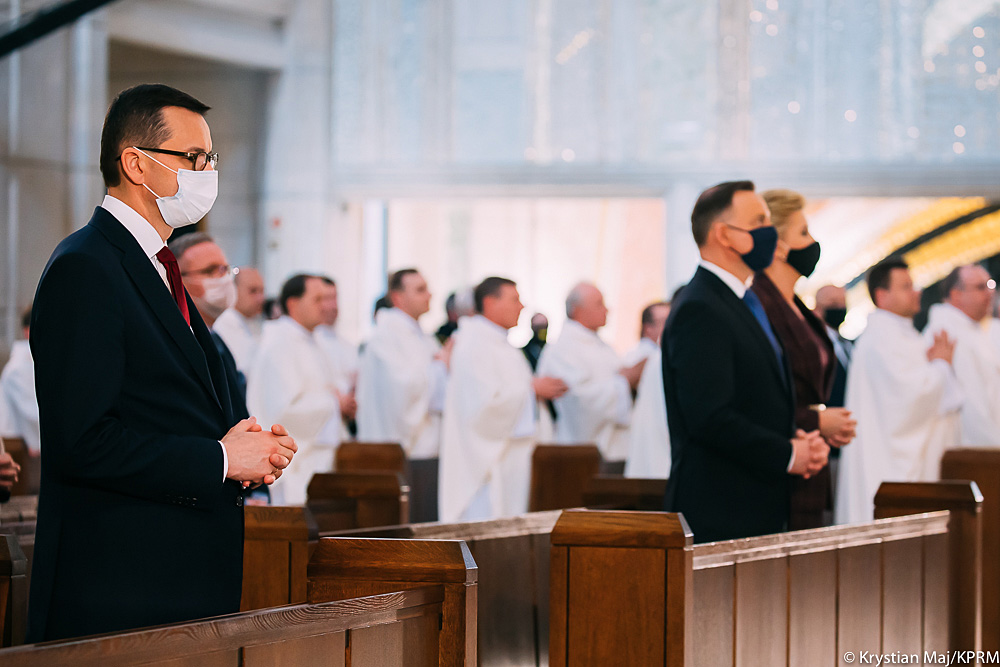The last four years have seen a significant decline in religious attendance among supporters of Poland’s centrist and left-wing opposition, of whom two thirds do not regularly go to church now. But voters of the national-conservative ruling party have retained high levels of religiosity, with four fifths regularly attending services.
The figures come from analysis by the Gazeta Wyborcza daily of polling conducted by state research agency CBOS in 2017 and 2021. In its monthly surveys, CBOS asks Poles how often they attend religious ceremonies: several times a week, once a week, once or twice a month, a few times a year, or never.
Gazeta Wyborcza classified as “religious” those who chose one of the first three options, and as “non-religious” those who picked one of the last two. It then divided supporters of the country’s main political parties and coalitions according to how many fell into each of the two categories in 2017 and 2021.
Based on CBOS data analysed and presented by Gazeta Wyborcza.
The figures show that supporters of Law and Justice (PiS), which heads Poland’s ruling coalition, remained consistently religious over the period in question, with 79% regularly attending church in both 2017 and 2021.
Other parties, however, saw significant declines: from 81% to 69% in the case of the centre-right, agrarian Polish People’s Party (PSL); from 48% to 34% for the centrist Civic Coalition (KO), the largest opposition group; and from 44% to 19% in the case of The Left (Lewica).
Gazeta Wyborcza also found that, among voters classified as “right wing” (supporters of PiS, KORWiN, Kukiz’15 or Confederation), the proportion defined as religious remained consistent, at 78% in 2017 and 75% in 2021.
But among those who support centrist, liberal and left-wing groups (KO, Lewica, PSL, and Poland 2050), there was a decline from 52% regularly attending church in 2017 to 36% in 2021. Among KO voters, over a third (37%) do not go to church at all; for Poland 2050 the figure is 32%.
Based on CBOS data analysed and presented by Gazeta Wyborcza.
The findings reflect growing differences in Poland over the role of the Catholic church in public and political life. Though officially around 90% of the population are defined as Catholics, in practice a much lower – and declining – proportion regularly attend church.
That process has accelerated in recent years amid revelations of child sex abuse by priests and failures or unwillingness of the church hierarchy to deal with the issue, as well as anger over a near-total ban on abortion introduced with the support of bishops.
Polling published last year showed that the church had recorded a bigger decline in trust than any other institution in Poland over recent years. Another survey found that only 9% of young people view the church positively.
PiS, which has close ties to the church, has argued that the Catholic faith should continue to play a central role in public life. The church is the “repository of the only moral system commonly known in Poland” and “rejection of it is nihilism”, said PiS chairman Jarosław Kaczyński last year.
The leaders of centrist parties have, however, increasingly called for a stronger separation of church and state, though often while also emphasising that they remain committed Catholics themselves.
Donald Tusk, leader of Civic Platform (PO), recently declared that he has “no problem saying clearly and loudly I am a Catholic”. But he accused PiS and some bishops of “destroying the church”, and also called for religious symbols such as crosses to be removed from public buildings.
Szymon Hołownia, leader of the recently formed Poland 2050 (Polska 2050) movement and a practising Catholic who once began training to become a priest, this year set out a plan to end the “corrupting” links between church and state.
The leader of PSL, Władysław Kosiniak-Kamysz, told Notes from Poland last year that “religion has a great role to play in society, but not in politics. We have to move politics out of Polish churches”.
The Left is the most explicitly anti-clerical of Poland’s main political parties. It has called for an end to Catholic catechism classes in public schools. The far-right Confederation (Konfederacja), by contrast, places great emphasis on Poland’s Catholic faith.
Main image credit: Krystian Maj/KPRM (under CC BY-NC-ND 2.0)

Daniel Tilles is editor-in-chief of Notes from Poland. He has written on Polish affairs for a wide range of publications, including Foreign Policy, POLITICO Europe, EUobserver and Dziennik Gazeta Prawna.




















